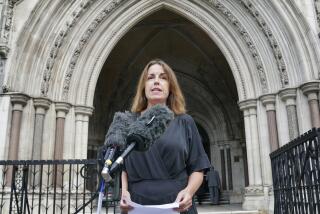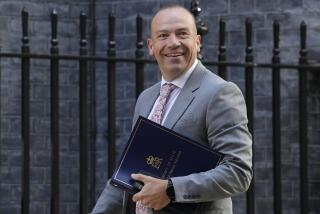Britain Prepares to Prosecute Nazi War Criminal Suspects
- Share via
LONDON — British prosecutors are preparing for what may be some of the most controversial trials in the postwar period--cases involving alleged Nazi war criminals still living in Britain.
Scotland Yard is assembling a nine-member team to investigate charges against suspected former Nazi concentration camp guards that could lead to Nuremberg-style trials, possibly by year’s end.
Detectives launched into the cases only after a parliamentary controversy arose when the House of Lords earlier this month rejected a bill permitting prosecution of suspected war criminals living in Britain. The Lords then were overruled by the House of Commons, making the War Crimes Bill a law, signed by Queen Elizabeth II last week.
Previously, under British law, suspected war criminals could be tried in Britain’s courts only if they were British citizens when they committed their offenses.
After World War II, possibly because Britain was not invaded and had no “collaborationist” problems as nations on the Continent did, Prime Ministers Winston Churchill and Clement Attlee tacitly agreed not to pursue the war crimes issue.
The main objection to the new law in the Lords--the legislative chamber that includes Britain’s senior judges and lawyers--is that, nearly 50 years after the crimes allegedly occurred, defendants could not possibly get fair trials.
Lord Shawcross, Britain’s chief prosecutor at the war crimes trials in Nuremberg, Germany, staunchly opposed the new law, arguing that it would be a “blot on the principles of British law and justice.” He and other opponents contended that testimony against war-crime defendants itself would be suspect because, as he put it, witness identification is “unsafe after four weeks and hopeless after 40 years.”
But Lord Jakobovits, Britain’s chief rabbi of the United Hebrew Congregation, argued that the British have a moral duty to prosecute war criminals, declaring: “The law will not exonerate those involved in horrendous crimes.”
Efraim Zuroff, the director of the Israel office of the Nazi-hunting Simon Wiesenthal Center--whose Los Angeles headquarters in 1986 brought to British attention charges that Nazis were living Britain--declared: “It is high time that the U.K. cease to offer haven to some of Hitler’s worst henchmen.”
Under prodding by the Wiesenthal Center, a British government-appointed commission found in 1989 that there was sufficient evidence to prosecute three unnamed suspects living in Britain. The commission also said 78 other individuals should be investigated further. Zuroff is expected to present eight more names to British investigators soon.
All the suspects are aging East European emigres, mainly from Latvia, Lithuania, the Ukraine and White Russia. They arrived among 200,000 displaced persons after the war, when cheap labor was needed, and procedures to scrutinize individuals for Nazi ties were often lax.
The main suspects are accused of aiding German officials in exterminating Jews and others after the Nazi invasion of Eastern Europe. Home Secretary Kenneth Baker said he has seen confidential evidence; the suspects, he said, committed some of “the most appalling crimes,” assisting in mass murders.
The accusations are similar to those raised against John Demjanjuk, a naturalized American accused of being a murderous Ukrainian prison guard in a German concentration camp.
He was extradited to Israel, where he was convicted in a trial that some Europeans have sharply criticized. “Identifying Ivan,” a recent book by Dutch professor Willem Wagenaar, for example, argues that the court in his case did not adhere to accepted Western rules on identifications.
British historian Norman Stone said of the book and the case: “The heart of the problem is simply that no man in his late 70s can be identified as the same man in his early 20s. The whole business of war-crime trials in this country at this long, long remove is a horrible thing.”
More to Read
Sign up for Essential California
The most important California stories and recommendations in your inbox every morning.
You may occasionally receive promotional content from the Los Angeles Times.










